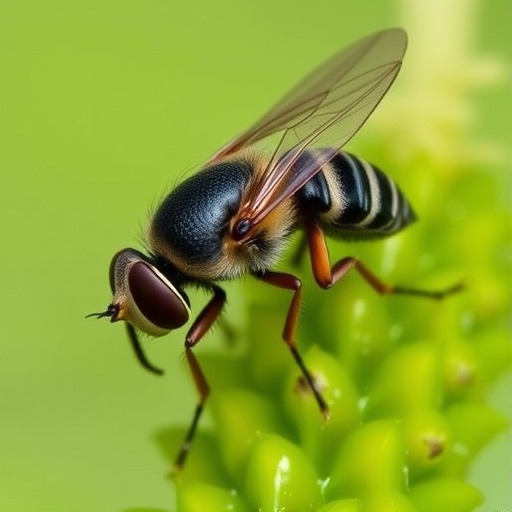In an era marked by an escalating waste crisis and the urgent need for sustainable practices, researchers and innovators are turning to the Black Soldier Fly larvae as a promising solution for waste valorization. This intriguing organism not only aids in the ecological decomposition of organic waste but also converts it into valuable biomass. Recognized for their voracious appetite and remarkable efficiency, Black Soldier Fly larvae can process food scraps, agricultural by-products, and other organic materials at a staggering rate, transforming what was once considered refuse into resources.
The life cycle of the Black Soldier Fly, commencing from the egg stage to the mature larval form, is strikingly efficient. The larvae can consume organic waste in just a few days, leading to significantly reduced waste mass. This process not only diminishes the volume of waste but also minimizes greenhouse gas emissions typically associated with waste decomposition in landfills. Moreover, as the larvae grow, they accumulate nutrients, thereby allowing farmers and food producers a sustainable means to obtain high-quality protein-rich feed.
Waste valorization using Black Soldier Fly larvae aligns with circular economy principles. By transforming waste materials into useful by-products, we can create a closed-loop system where resources are continuously reused. The larvae’s metabolic processes are adept at converting organic waste into high-protein biomass, which can play a vital role in animal feed formulations. With the demand for sustainable feed alternatives on the rise, the ability of Black Soldier Fly larvae to provide a nutrient-dense product at a lower environmental cost is groundbreaking.
However, the scale of production and the integration of Black Soldier Fly larvae in commercial applications pose several challenges. One of the main hurdles lies in the standardization of rearing conditions to ensure optimal growth and waste processing efficiency. Environmental factors such as temperature, humidity, and diet significantly influence the larvae’s productivity. Thus, extensive research is needed to establish best practices suitable for different environments while ensuring consistent performance.
Biotechnological innovations have taken center stage in enhancing the efficacy of using Black Soldier Fly larvae for waste valorization. Various research groups are exploring advancements in genetic selection and microbial symbiosis to improve the larvae’s digestion and nutrient absorption capabilities. These innovations aim to boost larvae productivity and ensure that the waste processing potential of these organisms is fully realized.
Moreover, researchers are investigating the biochemical properties of Black Soldier Fly larvae, particularly their fatty acid composition and protein quality. This research is vital as it will determine the viability of using larvae-based biomass in human food products. The increasing interest in entomophagy—the practice of consuming insects—opens a new horizon for Black Soldier Fly larvae, as they could potentially serve both as a sustainable protein source and a solution for transforming food waste.
In addition to their use in animal feed and potential for human consumption, Black Soldier Fly larvae can contribute significantly to soil health. The excrement produced during the larval stage is rich in nutrients and can be processed into an organic fertilizer. This not only enhances soil fertility but also promotes sustainable agricultural practices. With the global population increasing, maintaining soil health is crucial for ensuring food security, and Black Soldier Fly larvae present an innovative approach to achieving this goal.
Despite the myriad of benefits, public perception remains a critical barrier that could affect the widespread adoption of Black Soldier Fly technology. Education and awareness campaigns are essential to inform consumers about the environmental advantages of using insect-based products and to dispel any misconceptions regarding their safety and nutritional value. With a well-informed public, the acceptance of Black Soldier Fly larvae in various sectors could significantly increase.
The economic implications of incorporating Black Soldier Fly larvae into waste management systems could be profound. As the demand for sustainable waste processing solutions rises, investment opportunities in insect farming and biotechnology could attract financial backing and create new job markets. This shift towards innovative waste valorization could also drive economic growth in communities that embrace sustainable practices.
As awareness of sustainability issues increases among corporations and consumers, the expansion of projects focused on Black Soldier Fly larvae will likely gain traction. Collaborative efforts between innovators, researchers, policy-makers, and local communities are needed to create supportive frameworks that encourage the adoption of waste valorization technologies. The potential applications of Black Soldier Fly larvae could lead to transformative changes in how societies manage waste.
In conclusion, harnessing the capabilities of Black Soldier Fly larvae presents a revolutionary approach to waste management and sustainability. Their efficiency in converting organic waste into high-quality biomass positions them as a central player in the future of waste valorization. As research continues to unveil their potential and as society becomes more aware of the necessity for sustainable practices, the Black Soldier Fly larvae could very well become an integral component of a circular economy.
The journey toward sustainable waste valorization through Black Soldier Fly larvae illustrates a significant convergence of ecology and technology. As we seek solutions to pressing environmental issues, the insights gained from ongoing research will set the foundation for innovative practices that prioritize both waste reduction and the creation of valuable resources. Ultimately, embracing this approach will not only address current ecological challenges but also establish a sustainable framework for future generations.
Subject of Research: Harnessing Black Soldier Fly Larvae for Sustainable Waste Valorisation
Article Title: Harnessing Black Soldier Fly Larvae for Sustainable Waste Valorisation: Advances, Challenges, and Biotechnological Innovations
Article References:
Mkilima, T. Harnessing Black Soldier Fly Larvae for Sustainable Waste Valorisation: Advances, Challenges, and Biotechnological Innovations.
Waste Biomass Valor (2025). https://doi.org/10.1007/s12649-025-03372-3
Image Credits: AI Generated
DOI: https://doi.org/10.1007/s12649-025-03372-3
Keywords: Black Soldier Fly, waste valorization, sustainability, biotechnology, circular economy, insect farming.




